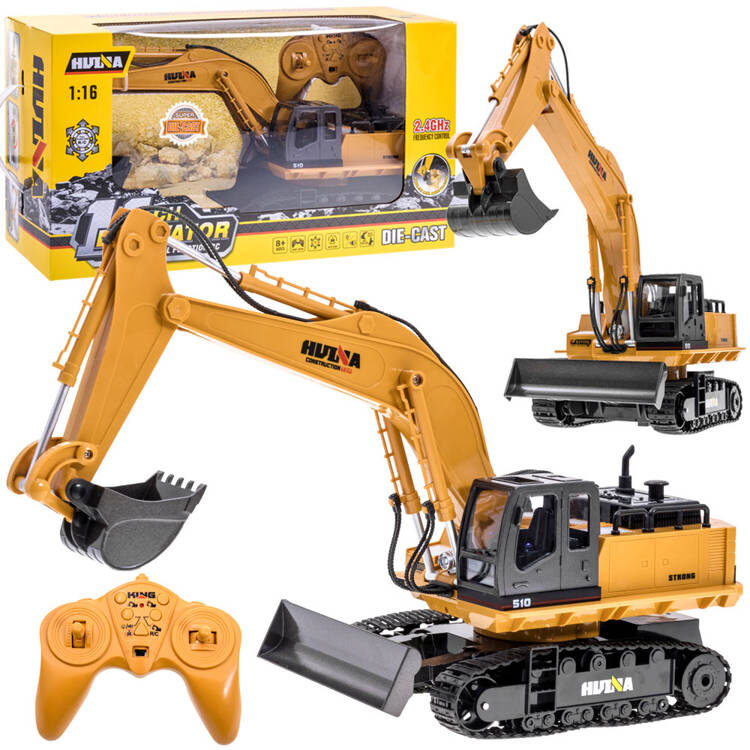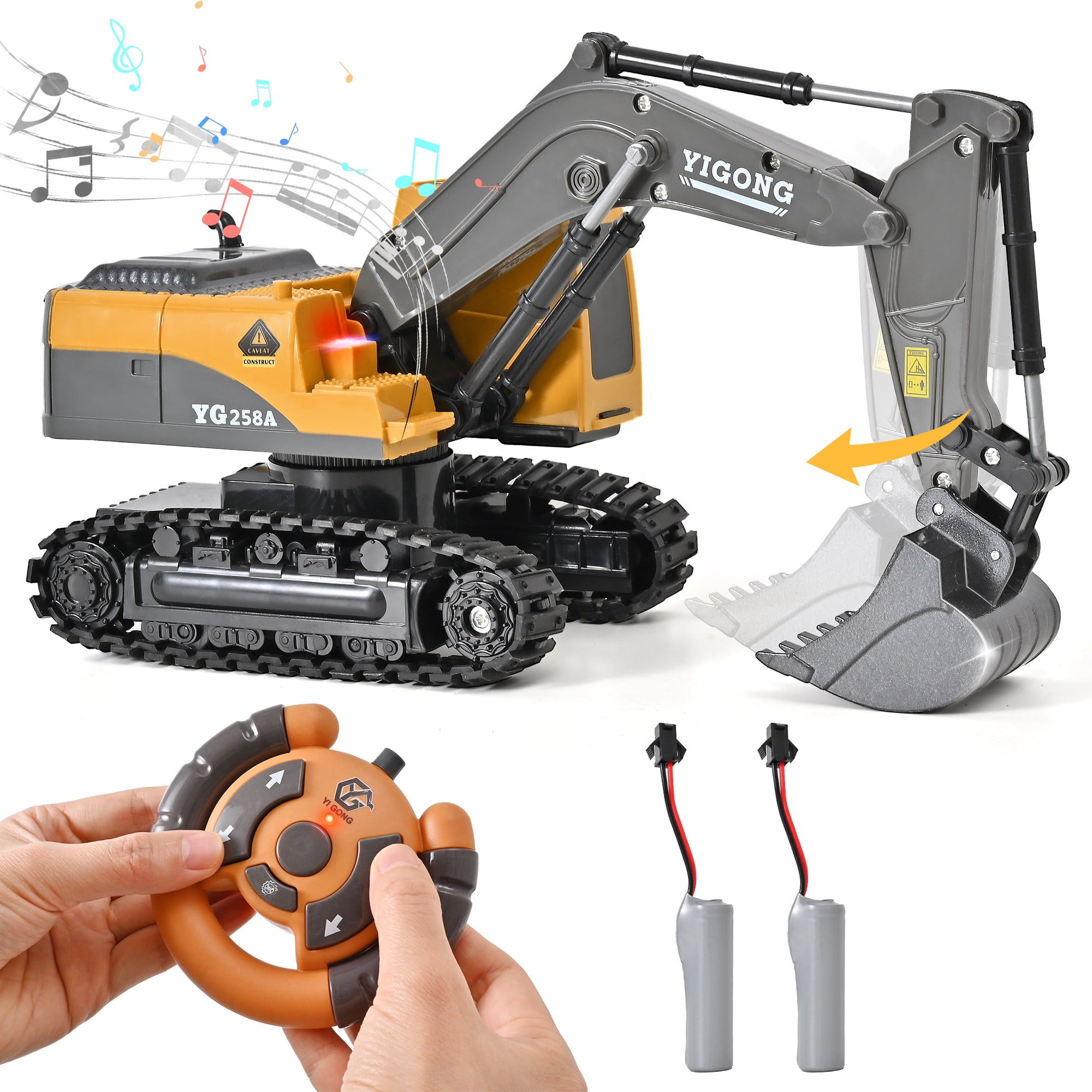Discover the Value of Excavator in Modern Construction Projects
Excavators are vital devices in contemporary building and construction tasks. Their versatility allows them to do a vast array of tasks, from digging and grading to demolition and site preparation. Advanced features, such as hydraulic add-ons and GPS, boost their abilities and efficiency on job sites. As the sector develops, the significance of excavators grows even a lot more. Comprehending their duty can reveal insights right into the future of building practices. What lies ahead for these equipments?
The Versatility of Excavators in Various Projects
Although excavators are often related to massive building jobs, their adaptability allows them to be used in a vast array of applications, from property landscaping to energy upkeep. In city setups, excavators can browse limited rooms to dig structures for homes or install drain systems. Their capacity to execute delicate jobs makes them perfect for landscaping jobs, where they can dig deep into for fish ponds or plant trees. Furthermore, excavators play a necessary role in utility upkeep, effectively digging trenches for pipes or cable televisions without disrupting bordering areas. In agricultural applications, they help in land cleaning and dirt prep work. In addition, their versatility enables them to be geared up with different add-ons, enhancing their functionality across various jobs. This diverse nature of excavators not only simplifies various construction processes however also demonstrates their essential role in contemporary framework advancement and upkeep.
Key Features and Kinds of Excavators
The conversation on essential attributes and types of excavators highlights the essential features that make these devices indispensable in building. Different excavator kinds, each developed for details tasks, show their adaptability and effectiveness throughout various applications. rc excavator. Comprehending these classifications and attributes is vital for maximizing their usage in contemporary construction jobs
Excavator Types Review
Excavators play an essential role in modern building and construction, offering versatility and efficiency throughout numerous tasks. These hefty equipment units been available in numerous kinds, each customized for specific applications. The most common types consist of crawler excavators, recognized for their security on irregular surface, and rolled excavators, which offer better movement on paved surface areas. Miniature excavators are favored for tight areas and small-scale jobs, while long-reach excavators are designed for deep digging. Additionally, there are specialized excavators, such as hydraulic excavators, which improve power and accuracy. Each kind includes distinct capacities, making them essential for tasks ranging from excavating and grading to demolition and material handling. Recognizing these variations permits building experts to select the best excavator for their job needs.
Trick Features Explained
Comprehending the vital functions of excavators enhances their efficient application in building and construction tasks. Excavators are characterized by their powerful hydraulic systems, which supply the needed pressure for excavating, lifting, and relocating materials. Their articulated arms allow for a large range of motion, helping with specific procedures in constrained areas. In addition, the selection of attachments, such as buckets, grapples, and augers, increases their adaptability to meet different project needs. The size and weight of excavators additionally add to their stability and ability to move on numerous terrains. Additionally, developments in innovation have brought about the integration of general practitioner and automation, boosting precision and performance in excavation jobs. These attributes jointly position excavators as crucial devices in modern-day building and construction.
Applications in Building and construction
Changing building and construction sites, excavators play an essential role throughout various applications, varying from household building tasks to massive facilities advancements. These flexible machines are equipped for jobs such as excavating foundations, trenching for energies, and site grading. Different types of excavators, including spider, wheeled, and mini excavators, supply certain benefits tailored to the project requirements. Spider excavators stand out in rough surfaces, while rolled excavators offer wheelchair on smooth surfaces. Small excavators are suitable for restricted areas, making them preferred in urban setups. The efficiency and power of excavators considerably quicken construction procedures, guaranteeing timely job conclusion. Their flexibility additionally boosts their significance, allowing building and construction teams to tackle a diverse selection of difficulties successfully.
Enhancing Efficiency and Productivity on Job Sites
Maximizing efficiency and performance on work websites is a critical purpose in contemporary building and construction. Excavators play a crucial duty in attaining this objective by streamlining numerous jobs. Their ability to execute numerous features-- such as grading, lifting, and excavating-- reduces the need for added devices, therefore saving time and resources.Moreover, excavators enhance workflow by permitting faster completion of projects. With innovative functions like hydraulic accessories and GPS innovation, they can execute precise operations that decrease errors and revamp. This precision not just improves the top quality of job however also enhances material usage, contributing to set you back savings.The convenience of excavators permits them to adapt to different site conditions, guaranteeing that projects advance smoothly no matter challenges. By integrating excavators right into building and construction procedures, teams can significantly enhance their total productivity, resulting in timely job completion and raised earnings.
Safety And Security Advantages of Utilizing Excavators
Excavators substantially boost security on building sites through boosted operator exposure and minimized manual labor dangers. By supplying drivers with a clear sight of their surroundings, excavators assist to stop injuries and crashes. In addition, the equipment lessens the need for workers to take part in unsafe hand-operated tasks, additionally advertising a much safer job atmosphere.
Improved Operator Visibility
Although building sites can be disorderly and loaded with possible hazards, improved driver visibility plays an essential function in making sure safety and security when making use of excavators. Modern excavators are created with large, unhampered home windows and purposefully positioned mirrors, enabling operators to keep a clear view of their environments (rc excavator). This improved presence is critical for identifying pedestrians, various other equipment, and various challenges, considerably lowering the risk of mishaps. Furthermore, lots of excavators integrate sophisticated modern technology, such as sensing units and video cameras, to give operators with additional viewpoints, additionally enhancing recognition. The capacity to see more plainly not just aids in effective operation yet also cultivates a much safer workplace, making it Discover More easier for drivers to browse complex building sites without jeopardizing safety standards
Minimized Manual Work Dangers
When manual work is reduced via using excavators, many safety advantages emerge, significantly improving the health of building workers. Excavators minimize the physical pressure connected with heavy lifting and repetitive jobs, efficiently lowering the risk of musculoskeletal injuries. By automating procedures such as excavating, grading, and relocating materials, they permit employees to maintain a much safer distance from prospective risks. Additionally, excavators are geared up with sophisticated security attributes, such as rollover protection systems and improved driver functional designs, which even more protect employees on site. The outcome is a considerable decrease in work environment accidents and injuries, resulting in raised performance and spirits amongst building and construction groups. Inevitably, the adoption of excavators adds to a much safer and extra efficient construction setting.
Excavators in Earthmoving and Site Prep Work
In modern-day construction, a considerable portion of earthmoving and site preparation tasks counts on the efficiency and convenience of excavators. These equipments are designed to deal with various soil types and surface, making them essential for grading, excavating, and trenching activities. Their hydraulic arms can be furnished with various add-ons, such as augers and buckets, allowing drivers to tailor their approach based upon details job requirements.Excavators stand out at relocating huge volumes of earth promptly and successfully, which increases the general building and construction timeline. They can navigate limited spaces and challenging websites where traditional tools may have a hard time, improving performance. Furthermore, the accuracy of excavators guarantees that site preparation complies with rigorous requirements, reducing the risk of mistakes that can result in expensive rework.
The Function of Excavators in Demolition Tasks
Excavators play an essential role in demolition jobs, as they possess the power and dexterity required to take apart frameworks effectively. Geared up with different add-ons such as hydraulic breakers, shears, and grapples, these equipments can adapt to various demolition needs, whether for tiny structures or big industrial sites. Their convenience enables operators to deal with complex jobs while preserving security and precision.In addition to their demolition abilities, excavators promote debris removal, ensuring that work sites continue to be safe and organized. By damaging down structures into workable items, they permit structured cleaning and recycling of materials, lining up with contemporary sustainability efforts.Moreover, excavators can access limited spaces and navigate irregular terrain, making them indispensable in city demolition jobs. Overall, their robust design and multifunctionality make excavators an important property in the demolition stage of building, contributing significantly to task timelines and effectiveness.


Future Patterns in Excavator Modern Technology and Usage
As the building and construction market evolves, innovations in excavator modern technology are poised to transform their use and performance substantially. One substantial fad is the combination of automation and artificial intelligence, permitting excavators to run with marginal human intervention. This shift will certainly boost accuracy in jobs such as grading and trenching, decreasing human error and boosting productivity.Additionally, the increase of hybrid and electrical excavators is forming a more lasting construction atmosphere, reducing carbon exhausts and gas prices. Improved telematics systems are additionally arising, enabling real-time surveillance of machine performance and upkeep needs, which can lead to better functional efficiency and longer devices lifespan.Moreover, advancements in accessory technology are expanding the versatility of excavators, permitting them to carry out a wider series of jobs. The mix of these patterns demonstrates a future where excavators are smarter, greener, navigate to this site and a lot more versatile, eventually improving building and construction job dynamics.
Often Asked Concerns
Just How Do Excavators Compare to Other Building Machinery?
Excavators, defined by their adaptability and power, master excavating and earthmoving contrasted to various other equipment. Their ability to perform different jobs, including training and demolition, makes them indispensable in building and construction jobs, improving general performance.

What Is the Average Life Expectancy of an Excavator?
The average life-span of an excavator normally varies from 7,000 to 10,000 operating hours, depending upon maintenance, use conditions, and model. Proper treatment can expand this life-span, guaranteeing peak efficiency throughout its functional years.
Exactly How Are Excavators Kept for Optimum Performance?
Excavators require routine upkeep for peak efficiency, including routine assessments, liquid checks, filter substitutes, and timely repair work. Implementing a preventive upkeep schedule assists lengthen their life-span and assurances reliable procedure in various building and construction atmospheres.
What Are the Prices Related To Renting Out vs. Buying an Excavator?
The prices related to acquiring an excavator versus renting out differ substantially. Leasing offers reduced upfront expenses but can accumulate with time, while buying calls for a considerable initial financial investment, however provides lasting cost savings and possession possession benefits.
What Training Is Needed to Run an Excavator?
Operating an excavator calls for specialized training, normally including safety and security procedures, machine procedure methods, and visit the website environmental awareness. Accreditation programs usually mandate functional experience, making it possible for operators to handle various jobs successfully while ensuring conformity with market guidelines. The most typical kinds consist of crawler excavators, recognized for their stability on irregular surface, and wheeled excavators, which offer higher flexibility on paved surfaces. Tiny excavators are favored for tight spaces and small-scale tasks, while long-reach excavators are made for deep digging. In addition, there are specialized excavators, such as hydraulic excavators, which improve power and accuracy. Various types of excavators, including crawler, wheeled, and mini excavators, supply certain advantages customized to the project demands. Spider excavators succeed in rough terrains, while wheeled excavators offer mobility on smooth surfaces.
Comments on “5 Surprising Benefits of Integrating a rc excavator into Your Construction Process”